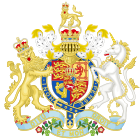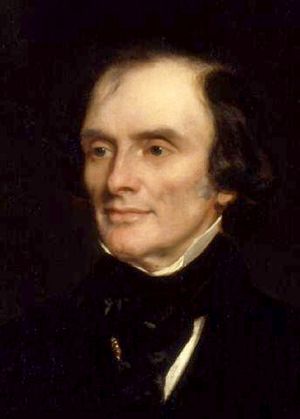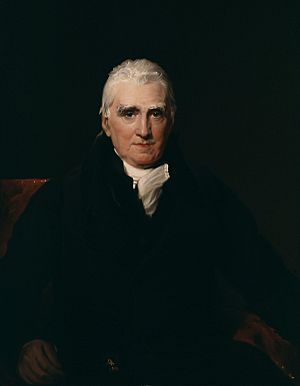Sacramental Test Act 1828 facts for kids
| Act of Parliament | |

|
|
| Long title | An Act for repealing so much of several Acts as imposes the Necessity of receiving the Sacrament of the Lord's Supper as a Qualification for certain Offices and Employments. |
|---|---|
| Citation | 9 Geo 4 c 17 |
| Dates | |
| Royal assent | 9 May 1828 |
|
Status: Repealed
|
|
The Sacramental Test Act 1828 was a law passed by the Parliament of the United Kingdom in 1828. This Act changed an old rule. Before this law, people who worked for the government had to take a special religious test. They had to receive Holy Communion in the Church of England. This new Act removed that requirement. Sir Robert Peel, a leading politician, worked with Church of England leaders to make this change happen.
Contents
Why the Law Was Needed
Old Rules for Public Jobs
For a long time, there were laws in England that said who could hold public jobs. The Corporation Act 1661 said that mayors and other city officials had to take Holy Communion according to the Church of England's rules. They also had to promise loyalty to the King and declare that certain old agreements were false.
Later, the Test Act 1673 made similar rules. It said that anyone holding a civil or military job for the King had to take loyalty oaths. They also had to receive the Anglican sacrament. These laws were meant to make sure that people in power were loyal to the Church of England.
Protestants Who Were Different
However, not all Protestants were part of the Church of England. These groups were called English Dissenters. They had different ways of worshiping. Even though the laws were strict, the government often passed a yearly law called an Indemnity Act. This Act usually allowed Dissenters to keep their public jobs. So, the strict rules were not always fully enforced.
Political Changes and Debates
In 1827, there was a lot of political change. The Prime Minister, Lord Liverpool, became ill. George Canning took over as Prime Minister. At this time, there was a big debate about "Catholic emancipation." This meant allowing Catholics to have more rights, including holding public office.
Many important politicians, like the Duke of Wellington and Sir Robert Peel, were against Catholic emancipation. Canning tried to form a government with other political groups, including the Whigs. They agreed not to try to change the Test and Corporation Acts right away. However, some politicians, like Lord John Russell, still wanted to repeal these old laws.
Passing the Act
In February 1828, Lord John Russell introduced a new bill. This bill aimed to repeal, or cancel, the Test and Corporation Acts. Russell argued that allowing religious freedom would actually make the Church of England stronger. He also felt it was wrong to use a sacred religious ceremony, like Holy Communion, just for a job requirement.
Sir Robert Peel, representing the government, supported the bill. But he had one condition. He wanted a special promise, called a declaration, to be added. This promise would make sure that people holding office would not try to harm the Protestant Church.
The promise said: "I, A. B., do solemnly declare that I will never exercise any power, authority, or influence, which I may possess by virtue of the office of — to injure or weaken the Protestant Church as it is by law established within this realm, or to disturb it in the possession of any rights or privileges to which it is by law entitled."
Approval in Parliament
This declaration was approved, and the bill then went to the House of Commons. It passed there with a strong vote. Next, it went to the House of Lords.
In March 1828, Sir Robert Peel met with important Church of England leaders, including archbishops and bishops. He convinced them to let the bill pass in the House of Lords. When the vote happened, no bishop opposed the bill.
Some older politicians, like Lord Eldon, were unhappy. They remembered past debates and felt this new law was dangerous for the Church. However, other politicians, like Lord Holland, saw it as a big step forward for religious freedom. They believed it showed that the government and the Church did not have to be completely tied together.
Some people tried to add changes to the bill to weaken it, but these attempts failed. However, one change was added: the words "upon the true faith of a Christian" were included in the declaration. This meant that non-Christians would still face challenges.
The bill passed its final vote on May 2nd, 1828. On May 9th, it received royal assent, meaning the King officially approved it, and it became law.
What the Act Changed
The Sacramental Test Act 1828 was a very important step. It led to more discussions about religious freedom, especially for Catholics.
Catholic Rights
Soon after this Act, the Roman Catholic Relief Act 1829 was passed. This new law went even further. It removed other old rules that had prevented Catholics from becoming Members of Parliament. Before this, MPs had to take an oath against certain Catholic beliefs. The 1829 Act removed these barriers.
Other Religions and Beliefs
Even with the new law, the phrase "upon the true faith of a Christian" in the declaration still caused problems. It meant that Jewish people could not easily hold political office. It took until 1858 for laws to change, allowing Jewish people to gain full political rights. People who did not believe in God (Atheists) were also still barred from office until 1886.
So, while the Sacramental Test Act 1828 was a big step for Protestant Dissenters, the fight for full religious equality continued for other groups.



